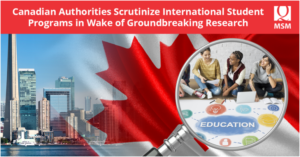The Immigration, Refugees and Citizenship Canada (IRCC) and the British Columbia (BC) Ministry are scrutinizing their international student programs following the release of new research. The study, which surveyed over 1,300 BC international students, has spurred the authorities into action, examining the effectiveness of their programs and their impact on the students’ future employment prospects.
The Research Findings
The survey indicates that many international students in BC are finding that their Canadian education has minimal impact on their job prospects. Furthermore, they often end up in jobs unrelated to their field of study, especially in a province known for low rates of offering permanent residency (PR). These findings have raised concerns about the efficacy of the current international student programs.
The research also revealed that 42% of the respondents used an international immigration consultant to apply for a study permit. This has led to calls for post-secondary institutions to sever connections with profit-driven actors. However, institutions like the University of British Columbia (UBC), which has the largest overall student population in BC, do not employ international immigration consultants but provide career counselors available to all students.
The Response of Authorities
The IRCC and the BC Ministry of Post-Secondary Education and Future Skills have been asked whether they plan to implement the key recommendations from this groundbreaking report. The recommendations include curbing the use of profit-oriented immigration consultants, offering career counseling and other resources tailored to international students, and simplifying the path to PR1.
However, the IRCC has not provided specific answers to these questions, merely restating the current rules for international students. The department did mention in a statement that they are currently reviewing the International Student Program. The aim of the review is to bolster the program’s integrity, protect international students, and modernize the program to better select and retain students that meet Canada’s economic and social-cultural goals.
The BC Ministry of Post-Secondary Education and Future Skills is also reviewing its policies and guidelines in response to the questionable recruitment methods used by immigration consultants. However, the ministry has not provided a timeline or any additional information about the review procedure.
Comments from the Education Industry
Raghwa Gopal, CEO of education management company M Square Media (MSM), provided his insights on the story. He said, “This research uncovers critical issues that we need to address urgently. Our educational institutions and immigration policies should work together to ensure that international students can leverage their Canadian education for better job opportunities.”
Gopal added, “The fact that many students are resorting to immigration consultants implies a need for more direct and clear guidance from institutions themselves. It is crucial that we prioritize creating a supportive environment for these students.”
Reflecting on the situation, he concluded, “As we look forward, it’s essential that we continue to scrutinize and refine our programs. We need to ensure they are not only beneficial for the students but also align with Canada’s broader economic and cultural objectives.”SEARCH FOR:




